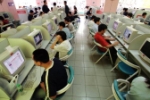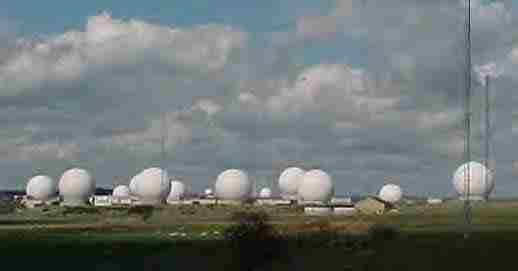|
REFLECTION IN THE DRAGON'S EYE: International News Analysis Today 
China's intelligence operations are the "core arena" for achieving the superpower status which the Communist elite in Beijing so passionately desires. Central to its spy activities is the island of Cuba which is strategically located for the interception of U.S. military and civilian satellite communications. China's spy services also cooperates closely with Havana's own world-class intelligence services. Inexplicably, the U.S. mass media are ignoring both the existence of the spy base as well as the Cuban-Chinese alliance which is responsible for it. International News Analysis Today is challenging that media silence in an exclusive interview with counterintelligence expert Chris Simmons, who explains why China needs Cuba and details the dangers to the United States in Havana's espionage partnership with Beijing. Simmons is a retired Counterintelligence Special Agent with 28 years service in the Army, Army Reserve, and the Defense Intelligence Agency, and has testified on the subject of Cuban espionage before members of U.S. House Foreign Affairs Committee. Simmons notes that China has the largest espionage network in the world with an estimated two million career staff intelligence officers, making Beijing's spy services larger than the intelligence operations of all the other nations in the world combined. While Americans are well aware of China's financial might, its espionage activities get relatively little attention. "We are too often distracted by China's economic gains. For China, however, espionage and economics are tied hand in hand, and China has the largest appetite for U.S. secrets in the world," Simmons told International News Analysis Today. The members of China's intelligence services, both its officers and those recruited as agents by those officers, tend to be ethnic Chinese, Simmons observed. This ethnic orientation of China's espionage services limits the available avenues of access to American security information. China's spy alliance with Cuba, however, assists China in overcoming this potential handicap. Cuban penetration of U.S. society augments Chinese efforts and makes an extremely valuable contribution to Beijing's overall espionage effort. Cuba's human intelligence operations give needed perspective to information China receives both from its own operatives and from electronic spy bases operating in Cuba. "That is why China needs Cuba," Simmons stated. The kind of restricted information gathered electronically in Cuba covers military, economic, and political affairs, and ranges from how foreign policy is determined to indications of troop and fleet movements to significant details on important political figures.
China is in the process of replacing Cuba's aging Soviet-era military equipment, purportedly supplying only "non-lethal" aid. The U.S. prohibits "lethal" assistance to Cuba, and Beijing is risking U.S. sanctions if that prohibition is known to be violated. The true volume and nature of Chinese military aid to Cuba is, of course, difficult to assess. General Guo's trip to Cuba follows a December 2010 military agreement, signed by top ranking PLA General Fu Quanyou, insuring needed military aid to the Castro regime. Simmons pointed out that China's electronic intelligence activities on Cuba are particularly interesting, because China claims they don't exist. "Officially they are not there," said Simmons, commenting upon Beijing's denials that it has electronic spying capabilities in Cuba. The island of Cuba has been used as an electronic spy base for decades, going back to the Soviet construction and use of the facility at Lourdes. The construction of the base at Lourdes was hard to miss as the concrete buildings and large antennas appeared on the Cuban landscape. The Russians pulled out of Lourdes in 2001, much to the relief of many in Washington and the expressed displeasure of Fidel Castro and his regime. Simmons stated that Moscow scored a propaganda victory in the U.S. media and among the U.S. political establishment with its abandonment of Lourdes. The reality of the matter, however, was much different than appearances seemed to indicate, Simmons told International News Analysis Today. When the Russians left Cuba, they also left a well-trained Cuban electronic intelligence battalion functioning on the island at the base in Bejucal, as well as an understanding with Havana to share intelligence information important to Moscow. As a result, Russia saved millions of dollars which had been spent on the Lourdes base, Moscow avoided Congressional censure and obtained important economic cooperation from the United States, all at the same time still receiving important intelligence information on the U.S. from Cuba. "It was a win-win situation for the Russians," Simmons stated.
In sharp contrast to Moscow, there is no political cost to China. "It took us years to find out they [the Communist Chinese] were operating there. We found out through émigrés, defectors, and travelers to Cuba," Simmons told INA Today. Unlike the Soviets, China has not constructed a facility and only with the greatest of difficulty can the Chinese be connected with Cuban electronic spy base activities. In this way, China can plausibly deny both the use of the base and the transference of information from its Havana embassy to Beijing, Simmons informed INA Today. The Chinese even took pains to cover the expected increase in radio traffic from the Chinese embassy in Havana to Beijing as the Bejucal base, and smaller bases across the island which are connected with it, became more active. In anticipation of a greater volume of radio communication activity between Cuba and China, Beijing gradually increased useless or "dummy" radio traffic with Havana. These "dummy" messages were later replaced, at least in part, with actual intelligence information generated from the Bejucal facility and its sub-stations as they became an important Chinese information source. As a result, the U.S. has difficulty determining the "spikes" of real intelligence information within the broadcasts of "dummy" transmissions coming from the Chinese embassy in Havana, Simmons said. The eye of the Chinese dragon is upon the United States. We do not know what information is coming from bases that supposedly do not exist, but Simmons commented on China's military and commercial investment in Communist Cuba and declared that, "Whatever they [the Chinese] are paying, they are getting a steal." Chris Simmons is a security consultant and is author of the soon to be released novel, The Spy's Wife.Add your name to our Exclusive Reports email list: International News Analysis
Return to INA TODAY.com homepage |
 The value Beijing places upon the information acquired via Havana can be seen in the October 2011visit to the island by Gen Guo Boxiong, Vice Chairman of China's Central Military Commission. Guo's presence in Cuba underscored that China has a special military commitment in addition to a sizable economic investment in Cuba.
The value Beijing places upon the information acquired via Havana can be seen in the October 2011visit to the island by Gen Guo Boxiong, Vice Chairman of China's Central Military Commission. Guo's presence in Cuba underscored that China has a special military commitment in addition to a sizable economic investment in Cuba.  The base at Bejucal, however, is still operating. While the Cubans technically run it, some 50-100 Chinese intelligence officers are at Bejucal gathering and interpreting information, according to Simmons.
The base at Bejucal, however, is still operating. While the Cubans technically run it, some 50-100 Chinese intelligence officers are at Bejucal gathering and interpreting information, according to Simmons.